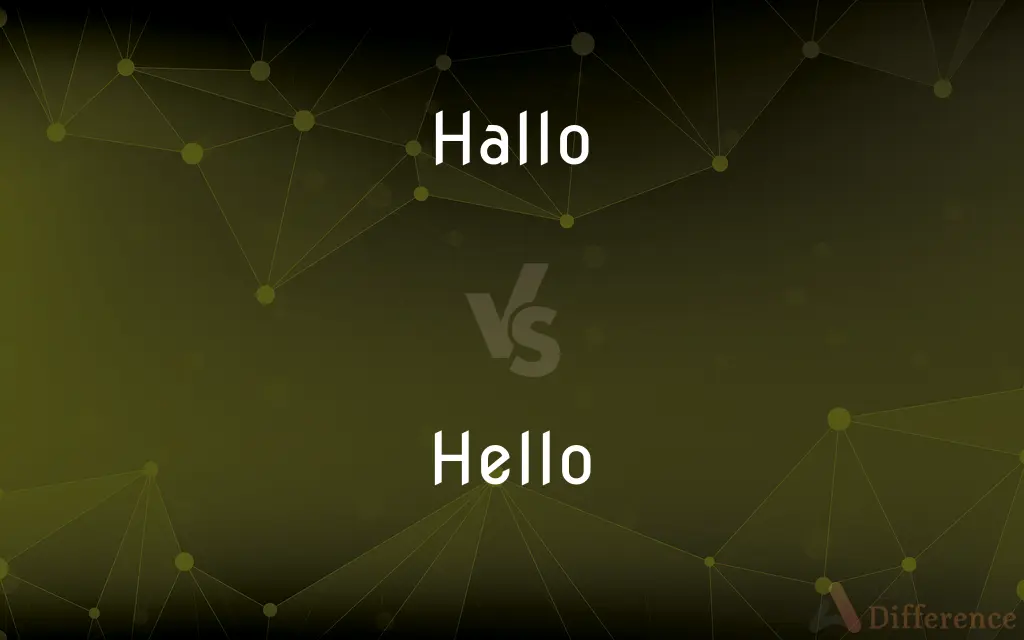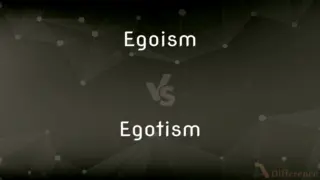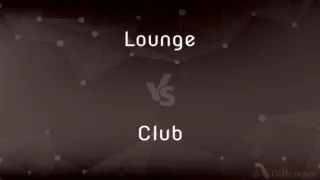Hallo vs. Hello — What's the Difference?
By Tayyaba Rehman — Updated on May 16, 2024
"Hallo" is a variation of "hello," often used in German-speaking countries, while "hello" is the standard English greeting.

Difference Between Hallo and Hello
Table of Contents
ADVERTISEMENT
Key Differences
"Hallo" and "hello" serve as greetings in their respective language contexts. "Hallo," with its German roots, is commonly used in Germany and other German-speaking regions as a casual or informal way to greet someone. The spelling reflects its Germanic origin and pronunciation, which is a bit different from the English "hello."
On the other hand, "hello" is the conventional spelling in English, used widely in both formal and informal situations. This form has become internationally recognized due to the global influence of the English language. When answering the telephone or greeting someone, "hello" is the go-to expression for English speakers around the world.
While "hello" is deeply entrenched in the English language, "hallo" can occasionally be found in English as an exclamation, often reflecting surprise or strong emotion. The use of "hallo" in English-speaking countries tends to be more colloquial and can sometimes be seen in British English as an alternative form.
In literature, "hello" is the standard spelling that readers would encounter, while "hallo" may be used to give a character or setting a distinctly non-American English or foreign flavor. Authors may choose "hallo" to suggest an accent or to set a scene in a country where German is spoken.
Despite their spelling differences, both "hallo" and "hello" are recognized and understood as greetings. The choice between them typically depends on the speaker's cultural context or the writer's stylistic preference. Each word carries the same essential function—to acknowledge someone's presence and initiate communication.
ADVERTISEMENT
Comparison Chart
Language Origin
German origin
English origin
Usage by Region
Used in German-speaking countries and some parts of the UK
Used globally in English-speaking countries
Standard Spelling
Non-standard in English
Standard spelling in English
Use in Literature
Used to convey foreignness or specific dialects in English literature
Standard greeting in English literature
Phonetic Difference
Pronounced with a slightly open "a" sound
Pronounced with an "e" that may be silent or pronounced as a schwa (ə) sound
Compare with Definitions
Hallo
German Greeting
Hallo, wie geht's dir? she asked her friend in Berlin.
Hello
Friendly Salutation
Hello there, how's your day going? he greeted his neighbor.
Hallo
Surprised Exclamation
Hallo! What's going on here? he exclaimed.
Hello
Expression of Surprise
Hello! I wasn't expecting to see you here, he said.
Hallo
Informal Salutation
Hallo, everyone, let's get the meeting started, announced the host.
Hello
Telephone Greeting
Hello, this is John speaking, he answered the call.
Hallo
Telephone Answering
She picked up the phone and cheerfully said, Hallo!
Hello
Polite Acknowledgment
Hello, may I please speak with the manager? she inquired.
Hallo
A shout of exultation.
Hello
Hello is a salutation or greeting in the English language. It is first attested in writing from 1826.
Hallo
(transitive) To cry "hallo" (to someone).
Hello
Used to greet someone, answer the telephone, or express surprise.
Hallo
(dated) A cry of surprise.
Hello
Common Greeting
Hello, it's nice to meet you, she extended her hand.
Hallo
The cry "hallo!"
Hello
A calling or greeting of "hello."
Hallo
(intransitive) To shout, or to call with a loud voice.
Hello
To call "hello."
Hallo
(transitive) To chase while shouting "hallo!"
Hello
A greeting (salutation) said when meeting someone or acknowledging someone’s arrival or presence.
Hello, everyone.
Hallo
(transitive) To shout (something).
Hello
A greeting used when answering the telephone.
Hello? How may I help you?
Hallo
Attention-Getting
Hallo there! Can you help me? he called out.
Hello
A call for response if it is not clear if anyone is present or listening, or if a telephone conversation may have been disconnected.
Hello? Is anyone there?
Hello
(colloquial) Used sarcastically to imply that the person addressed has done something the speaker considers to be foolish, or missed something that should have been obvious.
You just tried to start your car with your cell phone. Hello?
Hello
An expression of puzzlement or discovery.
Hello! What’s going on here?
Hello
"Hello!" or an equivalent greeting.
Hello
(transitive) To greet with "hello".
Hello
An exclamation used as a greeting, to call attention, as an exclamation of surprise, or to encourage one. This variant of Halloo and Holloo has become the dominant form. In the United States, it is the most common greeting used in answering a telephone.
Hello
An expression of greeting;
Every morning they exchanged polite hellos
Common Curiosities
Is "hallo" a proper English word?
While "hallo" is understood, it is not the standard greeting in English.
Can "hallo" and "hello" be used interchangeably?
In English, "hello" is preferred, but "hallo" can be used informally or in certain dialects.
Why is "hello" used internationally?
"Hello" became internationally recognized through widespread English language influence.
Can "hallo" be found in English dictionaries?
Yes, as an alternative form or exclamation, not the standard greeting.
Can "hello" be used in writing formal letters?
"Hello" is generally casual; "Dear" is preferred in formal correspondence.
What is the etymology of "hello"?
"Hello" comes from "hallo," which was derived from Old High German "hal" (to call).
How are "hallo" and "hello" pronounced differently?
"Hallo" has an open "a" sound, while "hello" has an "e" pronounced as a schwa.
What are alternatives to "hello" in English?
Alternatives include "hi," "hey," "good morning/afternoon/evening."
Where is "hallo" most commonly used?
"Hallo" is most commonly used in Germany and other German-speaking areas.
Is "hello" a formal greeting?
"Hello" can be used both formally and informally in English.
When was "hello" first used?
"Hello" as a greeting became popular in the late 19th century.
Do "hallo" and "hello" have the same meaning?
Yes, they both are used to greet someone or attract attention.
In which languages is "hallo" used?
"Hallo" is used in German, Dutch, and some Scandinavian languages.
How did "hello" become the standard in English?
"Hello" was popularized in the 19th century, particularly with the advent of telephones.
Are there different spellings for "hello" in English?
"Hello" is the standard spelling; variations like "hallo" are less common.
Share Your Discovery

Previous Comparison
Egoism vs. Egotism
Next Comparison
Lounge vs. ClubAuthor Spotlight
Written by
Tayyaba RehmanTayyaba Rehman is a distinguished writer, currently serving as a primary contributor to askdifference.com. As a researcher in semantics and etymology, Tayyaba's passion for the complexity of languages and their distinctions has found a perfect home on the platform. Tayyaba delves into the intricacies of language, distinguishing between commonly confused words and phrases, thereby providing clarity for readers worldwide.













































